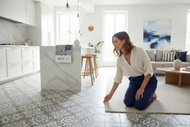Patterned Tiles Explained: Style, Versatility, and Value
Posted by Mike Belk on Oct 30, 2025

A recent report found that over 65 percent of homeowners now choose patterned tiles to make spaces feel more unique and inviting. These tiles turn simple floors or walls into eye-catching features, making every room look and feel truly custom. Patterned tiles can enhance everything from kitchens to hotel lobbies, offering lasting durability and a distinctive style that helps any space stand out.
Table of Contents
- Defining Patterned Tiles And Their Uses
- Types Of Patterned Tiles And Materials
- Design Impact On Residential And Commercial Spaces
- Durability, Maintenance, And Longevity Factors
- Cost Comparison With Plain Tiles And Value
- Common Mistakes When Selecting Patterned Tiles
Key Takeaways
| Point | Details |
|---|---|
| Patterned tiles significantly enhance spaces | They provide visual intrigue and elevate both residential and commercial environments through diverse designs and materials. |
| Material choice influences performance | Different tile materials offer unique aesthetic appeals and maintenance requirements, impacting durability and visual impact. |
| Investing in patterned tiles adds value | While initial costs may be higher, they enhance property marketability and potentially increase resale value over time. |
| Avoid common selection mistakes | Careful consideration of design scale, maintenance, and installation challenges is crucial to ensure successful tile choices. |
Defining Patterned Tiles and Their Uses
Patterned tiles are transformative decorative elements that elevate surfaces from ordinary to extraordinary. According to research, patterned tiles are distinctive tile designs featuring repeating geometric or artistic motifs that serve both aesthetic and functional purposes in residential and commercial spaces.
Unlike standard plain tiles, these decorative surfaces create visual intrigue through intricate designs. Tile patterns and designs can dramatically change the atmosphere of a room, turning floors, walls, and backsplashes into stunning focal points. They offer multiple advantages:
- Enhance visual appeal with complex geometric or artistic designs
- Provide durable surface coverage for high-traffic areas
- Create water-resistant installations for kitchens and bathrooms
- Add significant value to residential and commercial spaces
Patterned tiles represent more than just surface decoration. They are strategic design elements that combine practicality with artistic expression. Whether you’re seeking to create a bold statement in a modern kitchen or add subtle sophistication to a bathroom, these versatile tiles offer endless possibilities for personal and professional design transformations.
Types of Patterned Tiles and Materials
Patterned tiles showcase remarkable diversity in both design and material composition, offering homeowners and designers an expansive range of aesthetic and functional options. According to research, patterned tiles emerge in several distinctive styles, including geometric, floral, heritage-inspired, and intricate encaustic designs that transform ordinary surfaces into artistic statements.
Understanding the role of tile patterns reveals the nuanced world of tile materials and their unique characteristics. Different materials bring specific advantages to patterned tile designs:
- Cement and Encaustic Tiles: Hand-crafted, porous materials requiring regular sealing
- Glass Tiles: Highly reflective, ideal for wall and backsplash applications
- Terracotta and Quarry Tiles: Dense, earthy materials with excellent slip-resistant properties for high-traffic environments
- Digitally Printed Ceramics: Enabling complex, detailed design possibilities
The selection of tile material dramatically influences both the visual appeal and practical performance of a space. Whether you’re seeking the rustic charm of terracotta, the sleek reflectivity of glass, or the intricate patterns of encaustic tiles, each material offers a unique storytelling potential that can dramatically transform interior and exterior design landscapes.

Here’s a comparison of common patterned tile materials and their key characteristics:
| Material | Visual Appeal | Maintenance Needs | Ideal Application |
|---|---|---|---|
| Cement/Encaustic | Artistic Hand-crafted |
Regular sealing | Floors Bathrooms Kitchens |
| Glass | Sleek Highly reflective |
Low Easy cleaning |
Walls Backsplashes |
| Terracotta/Quarry | Rustic Earthy |
Regular sealing | High-traffic Outdoor areas |
| Digitally Printed Ceramic | Versatile Detailed |
Minimal | Any indoor surface |
| Porcelain | Subtle Elegant |
Minimal Stain-resistant |
Floors Bathrooms Kitchens |
Design Impact on Residential and Commercial Spaces
Patterned tiles have emerged as powerful design elements that transcend mere surface coverage, creating transformative visual experiences in both residential and commercial environments. According to research, these versatile design features can strategically define spaces, establish visual zones, and integrate seamlessly with broader interior design principles.
The Ultimate Guide to Patterned Tiles reveals how these dynamic design elements function across different settings. In residential spaces, patterned tiles offer multiple strategic advantages:
- Create visual interest in entryways and open-plan areas
- Define spatial zones without physical barriers
- Enhance aesthetic appeal through color coordination
- Provide durable, low-maintenance surface solutions
In commercial environments, patterned tiles serve both aesthetic and practical purposes. They can communicate brand identity, create memorable visual experiences, and withstand high-traffic demands. From restaurant floors to hotel lobbies, these tiles transform ordinary surfaces into engaging design statements that capture attention and elevate the overall spatial experience. The strategic use of patterned tiles demonstrates how design can be both beautiful and functionally intelligent, bridging artistic expression with practical performance.
Durability, Maintenance, and Longevity Factors
Tile durability varies dramatically across different materials, with each type presenting unique maintenance requirements and longevity potential. According to research, the performance and care needs of patterned tiles depend significantly on their fundamental composition and intended application.
Understanding the Role of Tile Layout Patterns highlights the critical maintenance considerations for different tile types. The durability landscape breaks down into several key material categories:
- Porcelain Tiles: Exceptionally stain and moisture-resistant, minimal maintenance required
- Ceramic Tiles: Variable care needs depending on specific finish
- Cement and Encaustic Tiles: Porous materials requiring regular sealing and specialized maintenance
- Glass Tiles: Excellent for walls, resistant to mold, but potentially slippery when used on floors
- Terracotta and Quarry Tiles: Require consistent sealing for moisture protection
The longevity of patterned tiles ultimately depends on selecting the right material for specific environmental conditions and implementing a consistent maintenance routine. Proper sealing, regular cleaning, and understanding each material’s unique characteristics can significantly extend the life and beauty of your tile installation, ensuring these design investments continue to enhance spaces for years to come.
Cost Comparison With Plain Tiles and Value
Patterned tiles represent a strategic investment that goes far beyond traditional flooring options, offering substantial long-term value compared to standard plain tiles. According to research, these design-forward surfaces not only enhance aesthetic appeal but can potentially increase property value through their unique visual and functional characteristics.
Understanding the Difference Between Porcelain and Ceramic Tile highlights the nuanced economic considerations of tile selection. While initial installation costs might be slightly higher for patterned tiles, their long-term benefits create compelling financial advantages:
- Enhanced property marketability
- Increased visual interest and design complexity
- Superior durability reducing replacement frequency
- Potential for higher resale value
- Reduced maintenance expenses over time
The true value of patterned tiles extends beyond mere monetary considerations. They transform spaces from ordinary to extraordinary, creating memorable design statements that reflect personal style and sophistication.
 By investing in patterned tiles, homeowners and commercial property owners are not just purchasing a surface covering, but acquiring a design element that continues to deliver aesthetic and financial returns throughout its lifecycle.
By investing in patterned tiles, homeowners and commercial property owners are not just purchasing a surface covering, but acquiring a design element that continues to deliver aesthetic and financial returns throughout its lifecycle.
Common Mistakes When Selecting Patterned Tiles
Tile selection involves more complexity than many homeowners realize, with numerous potential pitfalls that can compromise both aesthetic appeal and functional performance. Research highlights several critical errors that can dramatically impact the success of a patterned tile installation.
How to mix and match tiles like a tile pro reveals the nuanced challenges in tile selection. Common mistakes that can derail your design vision include:
- Overlooking pattern scale relative to room dimensions
- Neglecting to dry-lay tiles before final installation
- Choosing complex shapes without considering installation difficulty
- Ignoring maintenance requirements for specialty tile types
- Failing to account for waste and additional cutting costs
The most critical mistake is treating patterned tiles as a purely aesthetic choice. These design elements require careful consideration of room size, lighting, existing decor, and practical performance characteristics. Successful tile selection demands a holistic approach that balances visual impact with functional requirements, ensuring your investment enhances both the beauty and usability of your space.
Elevate Your Space with Patterned Tiles from BELK Tile
Choosing the right patterned tile goes beyond style. The challenge is finding designs that balance visual impact, durability, and ease of maintenance while reflecting your unique taste. This article highlights how patterned tiles can define spaces, create lasting impressions, and add real value to your home or commercial project. At BELK Tile, we understand these needs and offer a wide selection of high-quality tiles including ceramic, porcelain, glass mosaic, and specialty materials that combine beauty with long-lasting performance.
If you are searching for durable and stylish tiles that bring your vision to life without the guesswork, explore our collection today. Discover how easy it is to find the perfect patterned tile that fits your project by visiting BELK Tile’s homepage. Get inspired by our detailed product listings and enjoy features like quick-view options and personalized wishlists to make your shopping seamless. Don’t wait to transform your floors and walls into stunning design statements that stand the test of time.
Frequently Asked Questions
What are patterned tiles and how are they used?
Patterned tiles are decorative tiles featuring repeating geometric or artistic motifs that enhance the aesthetics of surfaces such as floors, walls, and backsplashes. They serve both functional and aesthetic purposes in residential and commercial spaces.
What types of materials are commonly used for patterned tiles?
Common materials for patterned tiles include cement and encaustic tiles, glass tiles, terracotta and quarry tiles, digitally printed ceramics, and porcelain. Each material has unique characteristics that affect both appearance and maintenance.
How do I maintain patterned tiles to ensure their longevity?
The maintenance of patterned tiles varies by material. For instance, porcelain tiles require minimal upkeep, while cement and encaustic tiles need regular sealing. Understanding the specific maintenance needs of each material and implementing a consistent cleaning routine can extend the life of your tiles.
What are the advantages of using patterned tiles over plain tiles?
Patterned tiles offer enhanced aesthetic appeal, increased property value, and unique design opportunities compared to plain tiles. They can create memorable visual experiences and withstand high-traffic demands, making them a wise investment for both residential and commercial spaces.



